Need to budget for full-time RVing? Yes, you do! This is the third and final post in our series about how to plan and pay for your full-time RVing lifestyle.?
Prepare for Full-time RVing Series: Part I | Part II | Part III
Download all 3 as PDF
Design Your Lifestyle to Budget for Full-Time RVing
During our first year on the road we regularly published our road tripping expenses to show people what the full-time RVing lifestyle cost. And we shared spreadsheets to help others budget for full-time RVing.
In the name of helping others live their full-time RVing dream, we had no problem revealing our lifestyle expenses like this. We did, however, receive criticism from some people who thought our spending was excessive, with comments on posts like these:
- Our First RV Travel Budget Results, August 2007
- RV Road Trip Expense Report: December 2008
- RV Road Trip Expenses: April and May 2009
Most of the negative comments came from readers who didn’t realize that our expense report includes the costs of maintaining our various online endeavors. Not every RVer has web hosting and Internet connectivity as a major portion of their budget, but we do. As location independent entrepreneurs, however, we include these business expenses in our monthly report because we work from home????wherever we decide to park it.
We’ll admit…sometimes our spending was a bit excessive, especially during our earliest days on the road. That’s before we learned to more carefully budget for full-time RVing.
For example, during our first year on the road in 2007 when we thought this lifestyle was temporary, we spent $4,641 on campground fees! By 2009, that figure was just $3,075 and by 2011, it fell to $922! We cut back on camping costs because the longer we stayed on the road, the more we learned how to save on RV park and camping fees.
Sample Spreadsheet to Budget for Full-time RVing
Our original full-time RVing Expense Spreadsheet shows the most common expenses we encountered on the road. Yours may be different, especially if you have kids (we don’t). In general, however, you’ll see that the expenses full-time RVers like us have aren’t that much different than stick house dwellers.
These full-time RVing expenses are:
- Fuel
- Rent
- Food
Estimate, Budget, Go!
To create your own full-time RVing budget, you’ll need to examine your existing lifestyle expenses (see Part 1 in this series). Don’t let “the B-word” scare you; review Dave Ramsey’s website for quick and easy tips. Or, check out the You Need A Budget book and app for guidance on how to set up a household budget – nomadic, or not.
In short, Dave’s advice is to simply name every dollar you earn at the beginning of the month. Every dollar you bring in must go into a category, whether it’s the gas bill or your savings account????we’re talking basic money management skills here. By assigning a place for every dollar and not going outside your budget, you’ll be on the road to freedom in no time!
Dave Ramsey Says:
“Unfortunately, the word budget has gotten a bum rap – it is basically just a PLAN. When you budget, you’re spending on paper, on purpose, before the month begins. But many people view a budget as a straight jacket that keeps them constrained. Freedom and budget just don’t seem to go together.
However, when you see that a budget is just spending your money with intention, you’ll actually experience more freedom than before. Many people say they’ve found even more money when they created a realistic budget and stuck with it.”
– Dave Ramsey
Because every? month is different, you’ll need to create a new budget for full-time RVing at the beginning of each month. We find that our budget works best if we high and allow lots of wiggle room for expenses, especially while on the road. You may want to add 15-20 percent to your figures just to see what a worst-case scenario looks like (for example, see how much we over-spent on fuel!).
The most important part of your budget, is do it every month and stick to it!?
To sum up how we pay for our road tripping lifestyle, we:
- Give every dollar a name at the beginning of the month
- Spend within our means
- Save and plan for major expected expenses
- Build an emergency fund for unexpected expenses
- Live debt-free
We guarantee, if you follow these steps you’ll be able to hit the road without worry and sleep well at night.
How to Live Frugal on the Road: Budget for Full-time RVing
Once you’re on the road, there’s lots you can do to save money and live within your means. Here are our biggest money saving tips for frugal and affordable full-time RVing.
Tip #1: Sign up for Passport America.
Camping fees are one of the biggest expenses you’ll encounter, and lots of newbies spend way too much on campground fees when they first get on the road. I know we did: our first year out we definitely didn’t know the cheapest ways to pay for full hookups. It took us nearly two years to discover Passport America.
We always prefer dry camping over staying in parks, but our Passport membership has saved our necks and our wallets several times when we really needed the convenience of full hookups.
In our opinion, nearly all camping membership clubs are as stupid as a condominium timeshare, but not Passport. This club has loads of participating RV parks (most without tight restrictions) and you’ll pay half of their going rate by being a member. Some campgrounds cost as little as $10 a night for full hookups!
Tip #2: Join Escapees, become Texans and use their mail forwarding service.
It took us two years before we realized that the services from the Escapees RV Club are the best resources for full-time RVers like us.
During our first year on the road, we were still Californicators and a family member was forwarding our mail (they volunteered). But after a year, we knew it was a hassle for them. Once we realized that our sabbatical was becoming a way of life, we knew we were pushing the limits of their generosity so we started looking into establishing a new domicile. Had we researched full-time RVers domicile tips sooner and became “SKPs,” we would have saved a ton of money on bureaucratic fees like car registration and taxes.
One of the reasons we urge every full-timer to become an Escapee is because as the world’s largest RV support network, Escapees can give you far better help in tricky situations, like a jury duty summons, than some mail forwarding service that doesn’t know a thing about the full-timing lifestyle.
Sure, it might be cheaper to domicile in other states like South Dakota, but you won’t have a huge organization looking out for your best interests as a full-timer. Escapees not only helps you know the ins-and-outs of choosing a domicile, but they advocate on RVers behalfs in state and federal government policy-making decisions. They also operate and provide discounts to fantastic RV parks across the country, and members have a real sense of camaraderie. We can’t recommend them highly enough.
Tip #3: Burn Fuel Use Wisely
Look online and you’ll find various online tools to estimate RV fuel expenses. We prefer to use GasBuddy to find the lowest fuel prices nearby, wherever we are.
For estimating travel expenses, we use the KOA Fuel Cost Estimator to gauge how much money we need per year, as the price of fuel creeps up.
When using the fuel calculator, we aim high, since fuel costs fluctuate? depending on the season. One thing we like about the KOA fuel cost calculator is that it keeps us from freaking out whenever fuel prices jump. By punching in our numbers, we can see that even when fuel prices rise, at worst we might only need to sacrifice one restaurant meal each month to stay within our travel budget.
Remember that one of the biggest factors affecting your fuel costs is your Gross Vehicle Weight Rating and your average driving speed.
When your rig is overweight and you’ve got the pedal to the metal, you will burn more fuel.
Be sure to weigh your rig and know how to tell if your RV is too heavy. Also remember that each mile you drive over 55 mph results in an additional cost of .25 cents per gallon!
One last word about fuel: If you’re still deciding on a rig, remember that while diesel may not always be the cheapest fuel, the mileage you get out of a tank of diesel will in most cases be better than with a gas engine, and save you money in the long run.
Tip #4: Invest in a Good Solar Setup
We love boondocking. It gets us closer to nature by allowing us to get as far away from civilization as possible, without hauling our stuff on our backs or having to dig a crap hole. The reason we can live in and run our business from the most remote parts of North America is we have a decent solar system.
Going solar has saved us thousands of dollars each year by allowing us to boondock on free or low-cost public lands. We started out knowing we would boondock, but we didn’t realize the extent of it, nor how much money doing so could save us.
Don’t make the RV solar system mistake we did: we didn’t spend as much money as we could have on our original solar setup. We installed a bare-bones system, which was fine for a long-term vacation but not for running a business full-time from the road.
Over the years we’ve slowly upgraded our RV solar power, but we really wished that we would have invested in a more powerful system from the get-go, especially when we had a fatter bank account from the sale of our first business. If you have the money saved up, don’t cheap out. Get a good system, it will pay for itself in a couple of years at most.
Tip #5: Never Pay Full Price for a Campground
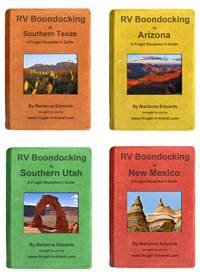
Passport America and Escapees are the only two discount camping clubs we find worth the cost. Passport’s 50 percent discount will pay for itself the first time you use it and Escapees 10 percent savings will pay for itself after a few nights. If you join Escapees, you can buy the $10 Escapees Day’s End Directory, which lists free and cheap boondocking spots all over the country. We save hundreds of dollars each year with this resource.
Web resources like RVParking.com and FreeCampsites.net are good sites to search. And the Shunpiker’s Guides to Frugal RVing are excellent regional resources for finding free and cheap boondocking sites around the country.
Tip #6: Travel on the Outskirts
Camping within a few minutes of the country’s most popular tourist destinations will force you to pay three times what you would normally pay for a comparable campground just outside the entertainment zone. There’s so much more to see and enjoy outside of popular tourist-trap areas. If you must camp near the major attractions, visit during the off season.
Tip #7: Learn to Cook
One of the hardest parts of being on the road is passing by so many great restaurants. Like us, you’ll probably find it tempting to try restaurant after restaurant when you first hit the road, but do your budget a favor and save eating out at restaurants for special occasions or after really long days on the road.
Cooking in a small kitchen can sometimes be challenging, but we’ve mastered it by focusing on meals that require one pot to prepare and utilizing our barbecue grill as often as possible. Check out the RV Cooking Show for more helpful tips. You’ll also find plenty of RVing cookbooks on Amazon.
More Tips for Living on the Road
Join Workamper News
Workamping usually involves working a designated amount of hours in exchange for free RV parking with hookups, and oftentimes bonus perks like free laundry. Some jobs require more commitment and effort than others, some pay a small wage and some do not, but each opportunity presents a chance to get to know an area in-depth and save a significant amount of money.
When I first ran some numbers to see what Workamping would save us during our first year on the road, I found is that for every four months of Workamping, we could add almost six more months of road tripping to our original budget. The organization Workamper, Inc. is the largest group dedicated to matching workampers with employers, but others like Workers on Wheels are also available to help you find that perfect opportunity.
See all our posts tagged workamping to learn about our experiences at various different jobs over the years, and join the Workampers Facebook Group to connect with others loving the lifestyle!
Work from Home
After working as location-independent entrepreneurs for more than five years, we published an e-book explaining how we do it. The most important bit of advice we have for anyone planning to work from the road is to develop multiple revenue streams.
Income Anywhere! describes in detail the various proven methods we have discovered to support our dream lifestyle. In addition to workamping we discuss blogging, selling online, crafting, writing, design, remote employment, product marketing and much more.
Another important tip is to work smarter, not harder! There are more than 500 established “home based businesses” in the U.S. that you can represent from home. Many are MLM based, others are downright scams, while some offer legitimate revenue sharing with a proven business model. Learn the warning signs of MLM scams and online schemes and discover how to identify scams and what to look for when considering a revenue sharing opportunity.
Network with Others
Join these great social networking groups to connect with other RVers who are making a living on the road:
- Facebook Workampers Group
- LinkedIn Workampers Group
- Nü RVers Facebook Group
- Nomadic Gigs Facebook Group
Investigate Employment Opportunities for RVers
Workamper News is the best resource for learning about the workamping lifestyle and finding jobs, but there are various other resources for learning how to make a living on the road. Below are a just few. Download Income Anywhere! or review the Workampers Group Resources Doc for many more. Always thoroughly investigate any opportunities you read about online before getting involved!
The Conclusion: Plan, Budget, Chart Your Course
Living the nomadic lifestyle can be cheaper than a traditional existence, there’s no doubt about it. How much cheaper is up to you and your family members. Remember, you need everyone on board with managing household expenses in order to have a successful journey, wherever you choose to go or however you want to live.
Do you want to just keep dreaming,
or are you ready to live the life you dream about?
Read all three posts in this series about how to prepare and pay for full-time RVing, and check out the articles below for more help in planning.
Remember…
The difference between a dream and a goal is a plan.
~ Dave Ramsey, The Total Money Makeover
More Tips to Plan and Budget for Full-time RVing:
Cutting the Costs of Full-Timing
Champagne Tastes on a Beer Budget
What’s Cheaper, Living in a House or on the Road?
Things We Do Differently When Learning to Full Time
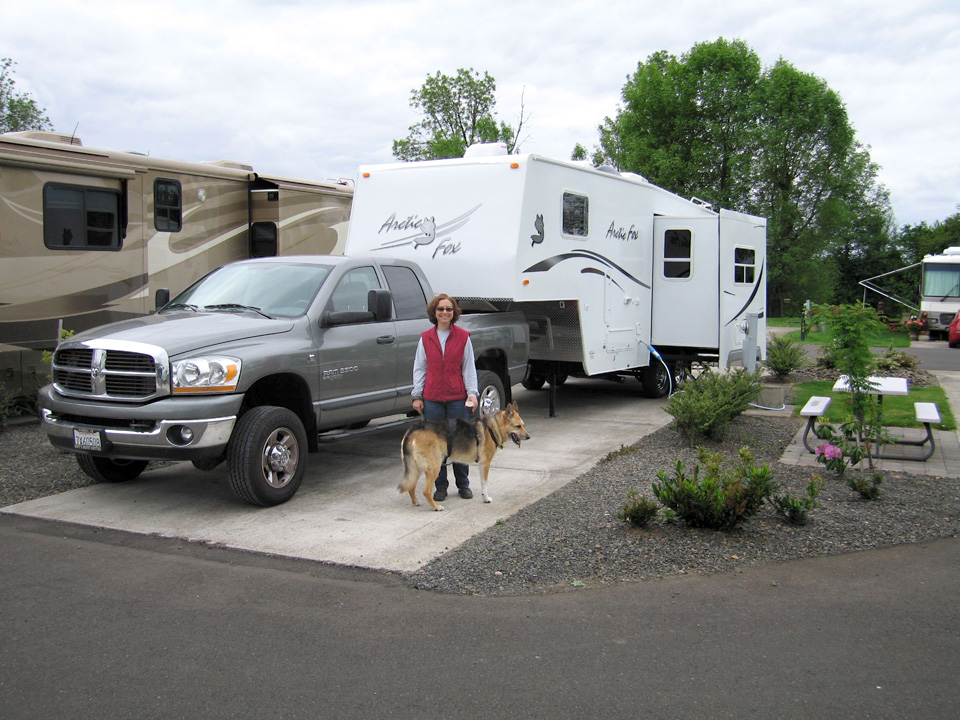
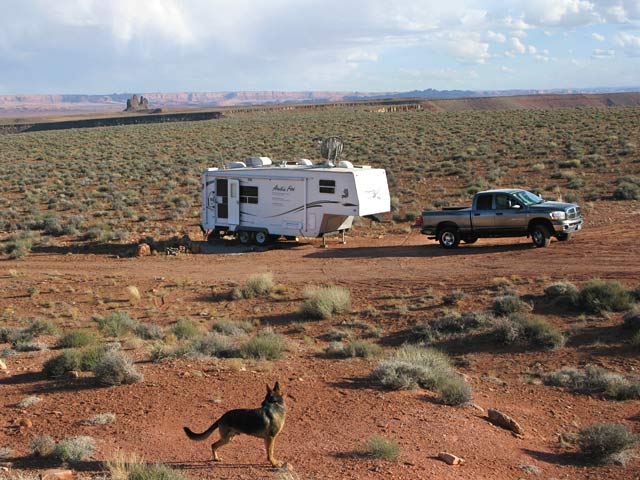

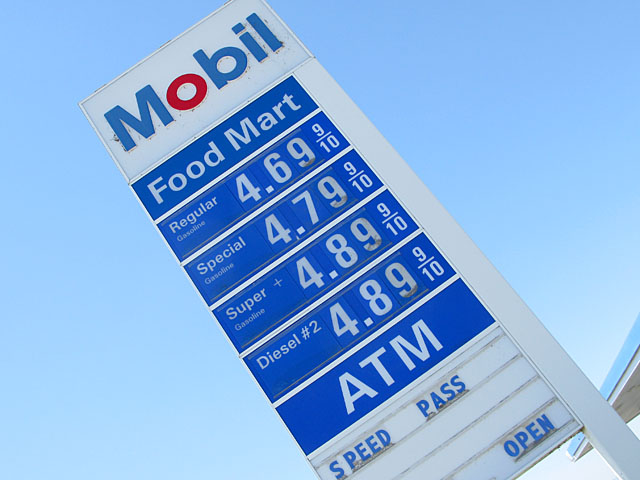
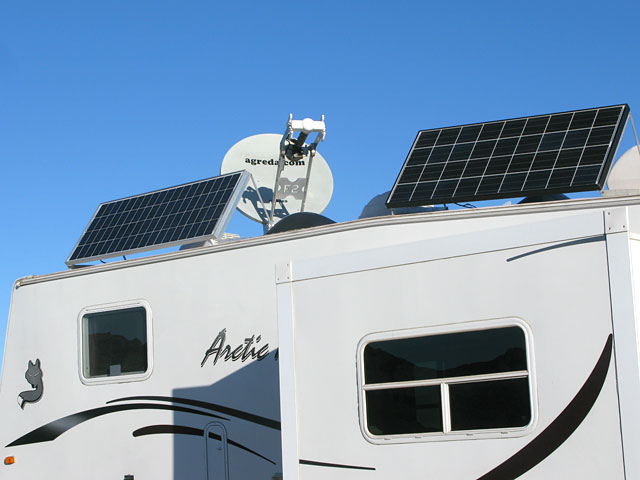




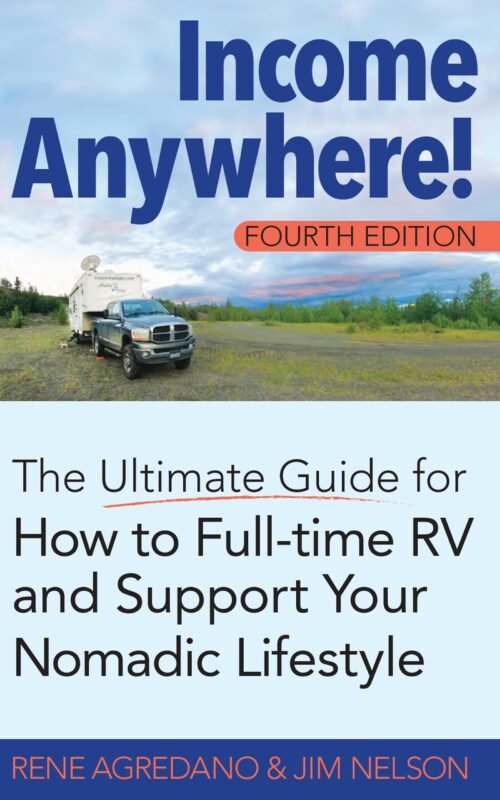
Solar panels for your RV! What a great idea. You have given me alot of infromation to think about when it comes to retiring and deciding when and where to travel. I appreciate your input.
I too look forward to boondocking a lot. Not only to save money, but because I like to be close to nature. I plan to have a nice solar array and a composting toilet. All I will have to worry about is fresh and grey water. With large enough tanks I should be good for a couple weeks or more.
My plan is to spend one or two nights at a camp ground to dump and top off fresh water, and plug in to fully charge batteries. If I work it right I would make that time in the middle of the week at cheaper rates.
My next goal is to plan multiple ways to earn a living. I don’t want to rely on one.
Bill, we’ve seen lots of people living this way, it’s totally realistic. Now about that composting toilet, we’re looking forward to seeing how it works for you.
And yes, multiple income streams are a must! Smart move.